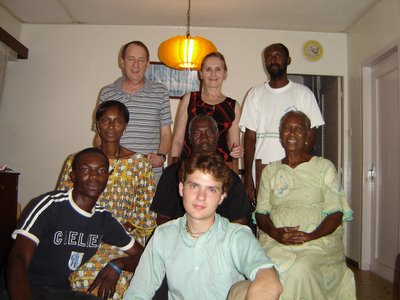Sama papa wu Senegal dafa gaanu
'My Senegalese father has died.' I knew my host father, Jean Kayounga, as the first person I greeted while easing shut the front door in the evening; him sitting in his plastic chair behind the dining table. "Bon-jour... Ça-va?" He spoke in plodding 2-syllable phrases, heavy with breath. I'd quickly shake his hand, correct the same grammar mistakes he'd make every night, and then move on to greet the rest of the family. I also remember him eating dinner across the table; lifting the spoon slowly as he tilted his head down to meet it; spilling varying amounts of his food onto the table, himself, and the floor; always eating a large second helping.
At first, the only explanation for Jean was that he was 'malade' but now I know more of the story. Jean had been seriously debilitated since he fell and hit his head in the shower more than twenty years ago. At the time he had been married to my host mother, Ernestine Kayounga, for only a year. Over the years, a combination Western medecine and Catholic prayers healed Jean to varying degrees, and apparently even allowed him to go back to work as a lycée teacher for a time. However for as long as I knew him, Jean walked stiffly by shuffling his right foot along, sat in his chair, and spoke only a few broken French phrases - though sometimes, in the midst of a conversation he would surprisingly grasp what was being said in French, Wolof, or his native Mankagne.
 (My two families. From top left: my father Derek, my mum Judith, suma nijaay (uncle) Denis, suma yaay (mother) Ernestine, suma papa Jean, suma maam (grandmother) Meme (Marie), sama rakk (older sibling) Christian, and me. I'm sorry for blocking out Jean with my head.)
(My two families. From top left: my father Derek, my mum Judith, suma nijaay (uncle) Denis, suma yaay (mother) Ernestine, suma papa Jean, suma maam (grandmother) Meme (Marie), sama rakk (older sibling) Christian, and me. I'm sorry for blocking out Jean with my head.)I didn't know how to feel about Jean, perhaps because I didn't know where I fit into the family. On occasions I deeply pitied him, and mulled over what I could possibly do to help. However to be honest, I was more often frustrated by the burden (physical, moral, and financial) he imposed on the family and the everyday annoyances he caused me: blocking the bathroom for an hour each morning, spilling and dirtying things around the house, shuffling into my room at 7 am to watch the sleeping figure of my host brother and his only child, Christian.
The morning of Jean's death, when I was woken up by the shrieks of Ernestine and Meme, my grandmother, the first thing I felt was relief. Ernestine would no longer pull double duty watching Jean and working full time, from 5 in the morning until 10 at night. Meme would no longer pace across Dakar looking for the next expensive perscription. The people of the house would finally have time for themselves.
But the grieving process here is intense, to say the very least.


0 Comments:
Enregistrer un commentaire
<< Home